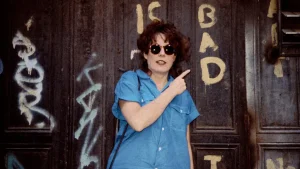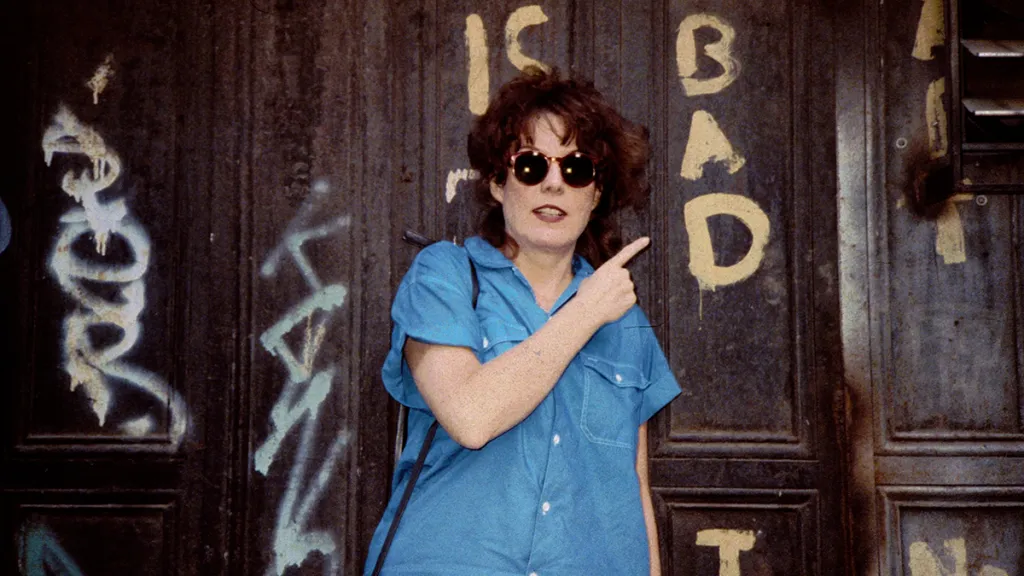Pretty Dirty: The Life and Times of Marilyn Minter—a new documentary that screened as part of the DOC NYC film festival at IFC Center on Thursday—exposes the perhaps underrated value that a sense of humor carries in the fickle, and sometimes demoralizing, contemporary art world. The film shares a name with the title of Minter’s retrospective, “Pretty/Dirty,” which toured the country from 2015 to 2017. By this point, Minter had been consistently making gritty, provocative work in New York for more than 40 years, but hadn’t found much lasting success until the early to mid-2000s.
Minter is now firmly part of the cultural zeitgeist. The look of her gritty-meets-glam enamel-on-metal paintings are immediately recognizable. She has been hired to shoot ad campaigns for Tom Ford and Zara. Her film Green Pink Caviar was used as a backdrop during Madonna’s 2009 Sticky Sweet tour, and her paintings were used in two of the main characters’ bedrooms on the television show Gossip Girl.
Filmmakers Jennifer Ash Rudick and Amanda Benchley worked on Pretty Dirty for three and a half years, first approaching Minter in April 2022. The film follows a fairly chronological documentary structure. Viewers learn about Minter’s increasingly dysfunctional upbringing in the South, first in Shreveport, Louisiana, then Miami, where her family moved when Minter was a child so that her ne’er-do-well father could be closer to the gambling scene in Cuba. In both places, she was raised by her emotionally abusive mother who spent most of her time smoking in bed, addicted to Demerol.
This is, unexpectedly, where Minter’s humor first seeps into the film: throughout Pretty Dirty, Minter reads snippets from the scathing letters her mother would write her, criticizing her ambition to become an artist and voicing her enduring disappointment in her daughter’s lifestyle. (At this point, Minter was battling her own addiction.) Sitting in a comfy chair, a dog on her lap, Minter laughs at the over-the-top nature of her mother’s disapproval, and during the screening, the audience laughed along with her. It’s funny, in a way, knowing how successful Minter is now. But it’s a subtle reminder of how much Minter had to overcome. Later in the film, she talks about how it took her nine years of sobriety to begin to understand where her mother was coming from.
“Art comes from pain, and [my mother] gave me a present,” Minter explained, during a Q&A after the screening.
The ideas of comfort and shame are throughlines in the film: what happens when your work depicts things you’re supposed to be ashamed of, making other people uncomfortable? What is the value in making those you work with feel comfortable in turn?
Minter’s career was on the upswing in the late 1980s when she created “Porn Grid,” a series of pornographic paintings that ran into the roadblock of second-wave feminism and were immediately slammed by many critics and fellow artists. Similarly, there is repeated discussion in the film about how museums and collectors have stopped short of purchasing a more recent series of large-scaled paintings of pubic hair, despite Minter’s attempts to make “a picture of pubic hair that’s so beautiful you could put it over your couch.” Minter laughs—and it’s a contagious laugh, for sure—recounting various career setbacks and disappointments, but bewilderment and frustration are visible on her face.
Marilyn Minter photographing Jane Fonda in her studio.
Courtesy Pretty Dirty: The Life and Times of Marilyn Minter
Interlaced with these observations are interviews with some of the celebrities who have come to Minter’s studio to be photographed. To the directors, they all—Lizzo, Padma Lakshmi, Jane Fonda, Pamela Anderson, Miley Cyrus, Monica Lewinsky—talk about how Minter made them feel safe and free.
Pretty Dirty features talking head interviews with many of Minter’s art world peers, among them Laurie Simmons and Jeff Koons. But it’s the slightly younger generation of artists whose words carry the most meaning. Jenna Gribbon, a painter who aims to show sexual desire between women without the burden of the male gaze, refers to Minter as her “art world hero.” She continued, “I think that Marilyn and I both operate where we try to use beauty as a trojan horse that draws the viewer in. Beauty can open this portal for someone to experience something that might have otherwise made them uncomfortable.”
Pretty Dirty: The Life and Times of Marilyn Minter is available to stream via DOC NYC’s website through Nov. 30.

